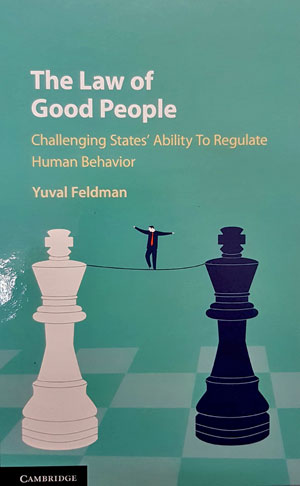
We have a misconstrued perception of who the “bad guys” are. In reality, (almost) all of us are violators of laws, regulations, contracts, and ethical norms. Various studies on the causes of such “ordinary unethicality,” including insurance fraud, employee theft, and tax evasion, suggest how prevalent, mindless, and sometimes banal wrongdoing can be. Acts of ordinary unethicality appear in private law disputes involving breach of contract, tortious interference, and lack of respect for people’s property rights. Much of the misconduct within the sphere of tax law, administrative law, and corporate law also involves this kind of moral transgression.
Behavioral ethics, a growing area within psychology and management, attempts to explain why ordinary unethicality is so prevalent. Behavioral ethics demonstrates that an individual’s unethical behavior can be explained through numerous processes such as self-deception, ethical fading, motivated reasoning, ethical dissonance, and moral disengagement. Since many of these mechanisms are only partially related to people’s deliberative reasoning, people still consider themselves good people even when they break legal or moral norms. From the perspective of the state, when people think about themselves as good people, much of the power of the traditional legal compliance mechanisms, which rely on incentives, fairness, transparency, and expressive values, is curtailed.
Despite this overwhelming evidence, to a large extent, current laws inspired by political theories such as Bentham’s still treat wrong-doers as deliberative individuals who abstain from socially undesirable behaviors only because of the expected costs associated with wrong-doing. Even when we move beyond theories of deterrence, the current dichotomy between people who obey laws for extrinsic reasons and people who obey laws for intrinsic reasons, misses a third and important category of good people who don’t think when they disobey a law or regulation, or violate other legal instruments, that they are indeed in violation of the law.
What I argue in this book is that legal intervention is needed to address the problem. How might good people be prevented from feeling comfortable enough with their violations of the law? Without that change in focus, we will miss many types of transgressions that happen not just due to lack of motivation but also due to limited awareness of the legal and moral character of such common behavior.
The book attempts to bring together three related bodies of literature and make them speak to each other. The first one is behavioral economics. Through thousands of experiments, this literature has shown how limited people are in their decision making. Current research on people’s bounded rationality, on solutions to problems such as pensions, food, organ donation, and the like, are important but behavioral sciences could potentially contribute more by doing more research on people’s ability to improve their ethicality and by writing more on larger questions such as the rule of law in society.
The second one is law and society, which focuses on compliance and rule following behavior with little attention paid to behavioral mechanisms. In contrast to studies in sociology and political science, the impact of the behavioral sciences on the law and society literature is limited to very narrow topics such as procedural justice and moral judgment; it misses the opportunity to use the behavioral sciences to study the motivations of people and to act on that knowledge. The third literature, behavioral ethics, which this book introduces to the legal scholarship, emerged in psychology and management, with less attention paid to legal institutions, compliance, and enforcement than will be needed, if we want to solve the problem of ordinary unethicality.
In this book, I combined these bodies of scholarship to suggest that we might be able to change laws with the intention of raising people’s awareness of the law and their motivation to follow the law. According to the view presented in the book, regulators should be able to determine in advance which types of situations are likely to encourage acts of ordinary unethicality; which policy tools are more or less effective when dealing with people who don’t view their actions as unethical or illegal; and could create a more effective regulatory system suitable for the different types of rule violators.
Intellectually, the book grew out of my background in psychology and law: I did my PhD in the Jurisprudence and Social Policy program at UC Berkeley between 1999 and 2004; there, I studied the gap between formal laws and social norms in the context of trade secret divulgence in Silicon Valley. I believe the fact that economists and psychologists––Bob Cooter, Rob Maccoun and Phil Tellock––rather than legal scholars were my advisors, ended up having a huge impact on my academic research, as I continued studying the behavioral mechanisms that underlie compliance in numerous contexts in the years since. My research has focused primarily on the behavioral aspects of the area of regulation, enforcement, and compliance. In 2011-2013, I had an opportunity to work in the Corruption Lab in Harvard University, where I was exposed to behavioral ethics, and had a chance to work with some of the founding fathers and mothers of this field (e.g., Mahzarin Banaji, Max Bazerman, and Fancesca Gino), leading me to focus on the intellectual and applied potential of bringing this field to bear more on legal scholarship.
The introduction, which provides some background, opens with descriptive and normative questions that behavioral ethics brings to the legal literature, such as people’s awareness and responsibilities concerning ethical choices. The chapter creates the framework for the book, identifies the gaps in the literature, and offers a paradigm for policy makers who wish to think about unethicality in our society.
This chapter also allows readers to recognize the challenges that the book creates for policy makers. Since many “good people” violate the law, either because they feel that the violation is justified or because of ignorance, many violations occur in areas that are rarely enforced by policy makers; and there lies the danger. One of the examples I discuss in chapter nine is non-monetary conflict of interest. The effects of this violation, such as positive media reports, invitations for keynote presentations, and others, are almost never prosecuted but are nonetheless dangerous since the public will find it harder to recognize them as problematic.
The last chapter in the book is also important for those who are browsing. It focuses on recommendations and applications of the “good people paradigm” for policy makers. It suggests how it might be possible to combine the different regulatory interventions concerning people with a new approach to law and ethics. Responsive regulation, an important paradigm discussed in the book, suggests that by shifting from less intrusive to more intrusive measures, interventions should be adaptable: different types of people require different types of interventions. In earlier stages the focus should be on lack of awareness of wrong-doing, while in later stages lack of motivation to comply could be addressed. Only by recognizing that people differ with regard to their level of awareness and their compliance motivation, policy makers will be able to develop the right combination of legal instruments.
My hope for the book is that it will push behavioral research more into the ethical arena. Clearly, we live in a world with high rates of ordinary unethicality. Though it affects the evolution of social and legal norms, this area of study has been neglected because the legal system focuses more on gross violations of the law, assuming that these present greater risks than unethical behavior by ordinary people in ordinary situations.
Moreover, behavioral economics, having dominated conversations between law and the behavioral sciences, has led academics and others in the behavioral insights field to focus more on fixing biases and heuristics in areas such as health, financial decision making, and energy, than on understanding the role of fairness and justice. Behavioral ethics, on the other hand, though it is a much younger field, has the potential to shift the attention of legal researchers and policy makers to the importance of the behavioral sciences in accounting for improvements in people’s ethical decision-making. Behavioral ethics scholars have showed us how good people are constantly misleading themselves about their behavior; they believe they are within the realms of law and morality, when in reality, they are not. I hope that the book will lead more scholars, behavioral insight units, managers and policy makers to focus on trying to make people more ethical, not just more rational.


Yuval Feldman is the Mori Lazarof Professor of Legal Research at Bar-Ilan University Faculty of Law and a Senior Research Fellow at the Israel Democracy Institute. He obtained his Ph.D. in Jurisprudence and Social Policy from UC Berkeley in 2004. His areas of research include behavioral law and economics, empirical legal studies, ethical decision-making, regulatory impact and social norms, compliance and enforcement. He was a fellow in the Edmond J. Safra Institutional Corruption Lab at Harvard Law School and the Implicit Social Cognition Lab in Harvard Psychology, 2011-2013. In 2016 he was elected to Israel’s Young Academy.